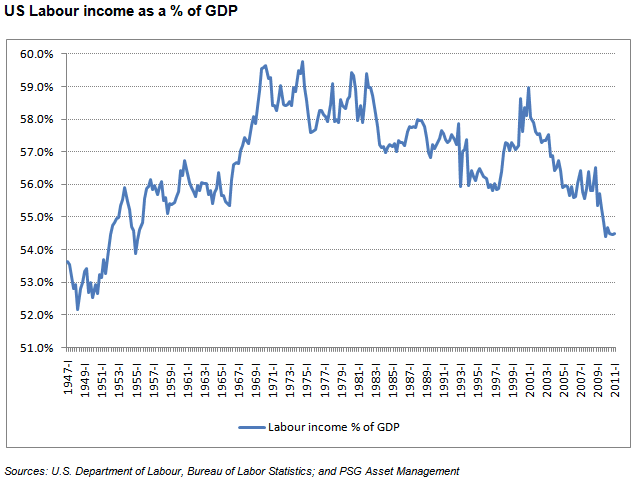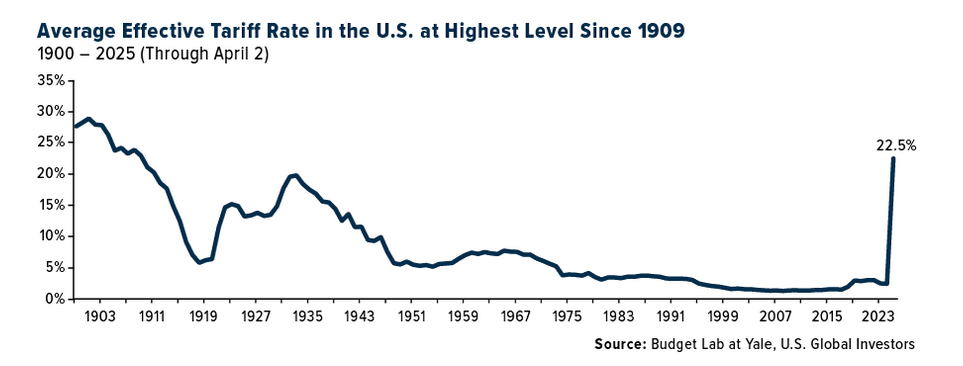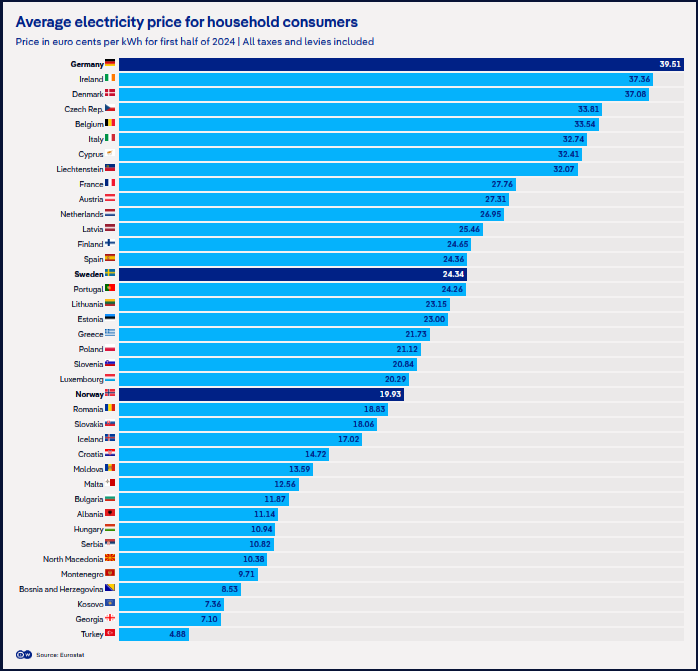The official unemployment rate in the U.S. stood at 9.0% in April. 13.7 million Americans are out of work. Even the lucky ones who hold a job are finding it difficult to make a decent living due to rising cost of living and stagnant to down wages. While equity markets have soared from the depths of the recent financial crisis in the developed world, the majority of workers have not benefited. Most of the spoils of this recovery has not gone to average workers.
From an article titled “The tipping point in labour’s share of the spoils looms” by Shaun Le Roux of PSG Asset management of South Africa:
The fact is, the benefits of the global economic recovery have accrued to the wealthy. As The Economist put it in a recent article, “the benefits of recovery seem to have been distributed almost entirely to the owners of capital rather than workers. In America total real wages have risen by $168 billion since the recovery began, but that has been far outstripped by a $528 billion jump in profits. Dhaval Joshi of BCA Research reckons that this is the first time profits have outperformed wages in absolute terms in 50 years.
In Germany profits have increased by €113 billion since the start of the recovery, and employee pay has risen by just €36 billion. Things look even worse for workers in Britain, where profits have risen by £14 billion but aggregate real wages have fallen by £2 billion. A study by the Institute for Fiscal Studies, a think-tank, found that the median British household had suffered the biggest three-year fall in real living standards since the early 1980s.†(¹)
As the chart below demonstrates, labour’s share of income in the US (represented as a % of GDP) has been in a steady decline for forty years. Now, some of this decline can be attributed to productivity gains and structural changes in the US’s drivers of output, but, at the same time that labour’s share has been declining, profit margins have been widening. This trend cannot be sustained indefinitely and the catalyst for a change in this state of affairs is likely to be inflationary pressure spilling over into demand for higher wages. The West has enjoyed three decades of remarkably benign inflation; globalization and the entry of cheaper emerging markets (amongst other things) have helped constrain cost pressures. But, this status quo looks about to change. As discussed above, wage pressures are building in the developing world, raw material costs have been rising and the world is no longer awash with cheap goods from the East. Inflation is coming.
Meanwhile U.S. companies hoard billions of dollars in cash. According to a Bloomberg report last October, U.S. firm held almost $1 Trillion in cash and other equivalents on their balance sheets. Another factor to consider in evaluating why U.S. workers are not enjoying the benefits of economic growth in recent decades is that firms are getting rid of workers in the U.S. and moving those jobs abroad where wages are cheap and government regulations lax. Globalization pits U.S. workers against third-workers who can work for $2 per day easily making U.S. workers unable to compete in the global market. As more and more workers find their jobs offshore-able any day, companies are able to squeeze more productivity and generate higher profits for their owners. The threat of losing their jobs in the current depressed labor market keeps the U.S. workforce docile and unable to demand higher wages.
From “Big U.S. Firms Shift Hiring Abroad” in The Wall Street Journal:
U.S. multinational corporations, the big brand-name companies that employ a fifth of all American workers, have been hiring abroad while cutting back at home, sharpening the debate over globalization’s effect on the U.S. economy.
The companies cut their work forces in the U.S. by 2.9 million during the 2000s while increasing employment overseas by 2.4 million, new data from the U.S. Commerce Department show. That’s a big switch from the 1990s, when they added jobs everywhere: 4.4 million in the U.S. and 2.7 million abroad. (emphasis added)
In all, U.S. multinationals employed 21.1 million people at home in 2009 and 10.3 million elsewhere, including increasing numbers of higher-skilled foreign workers.
The trend highlights the growing importance of other economies, particularly in rapidly growing Asia, to big U.S. businesses such as General Electric Co., Caterpillar Inc., Microsoft Corp. and Wal-Mart Stores Inc.
The data also underscore the vulnerability of the U.S. economy, particularly at a time when unemployment is high and wages aren’t rising. Jobs at multinationals tend to pay above-average wages and, for decades, sustained the American middle class.
As of today the above article has generated 678 comments on the Journal’s site. So unless structural changes are made by bold and responsible politicians, high unemployment and stagnant wages will continue to strangle the U.S. economy. For investors this gives another reason to invest abroad.




